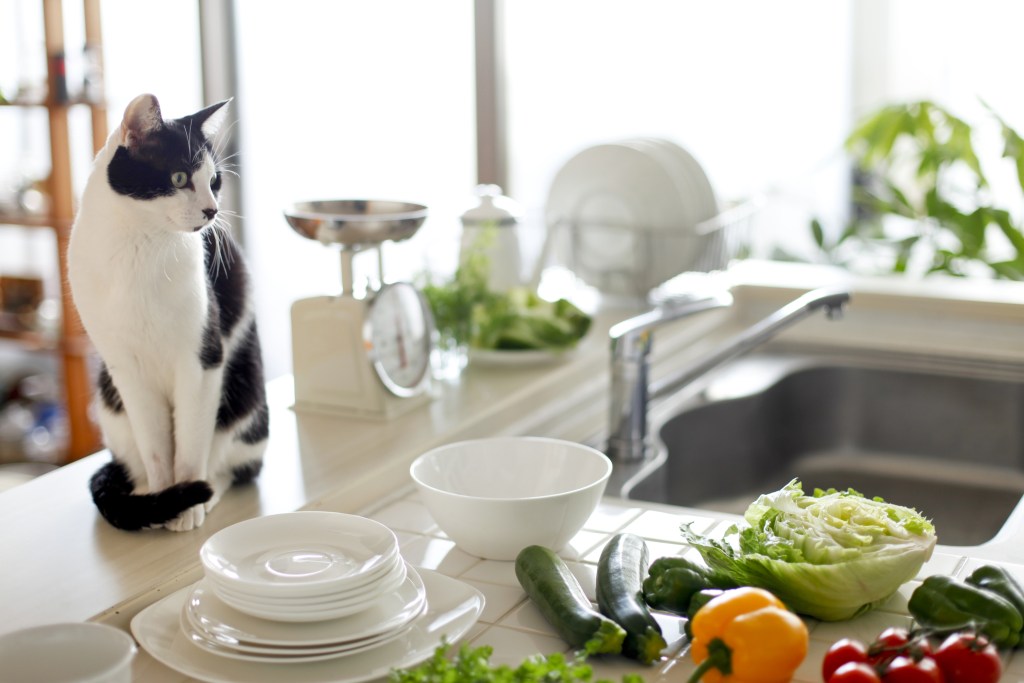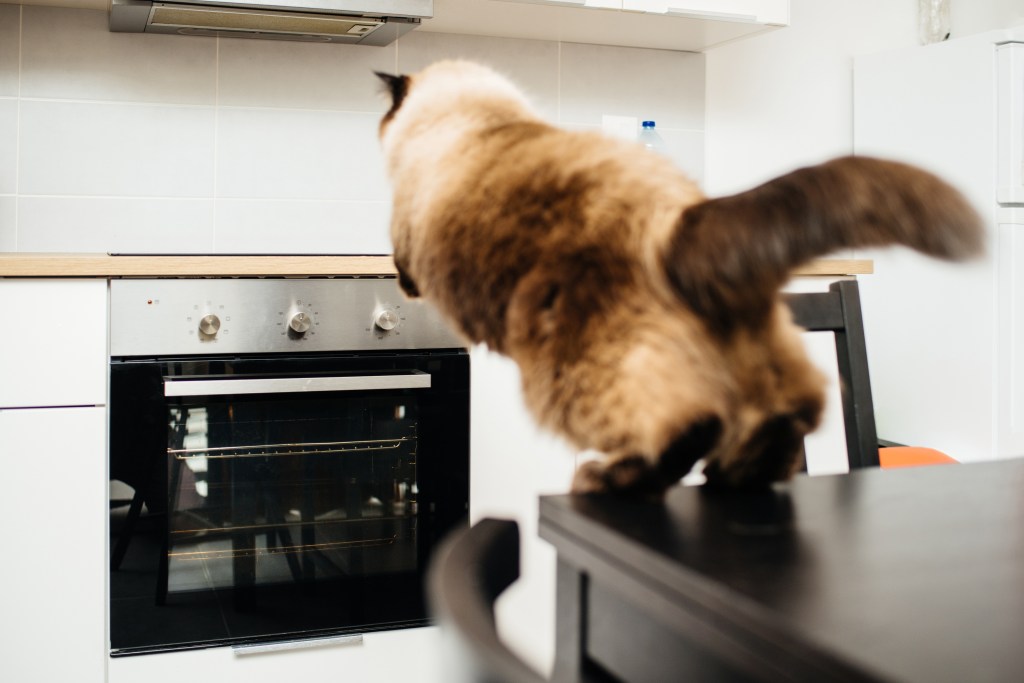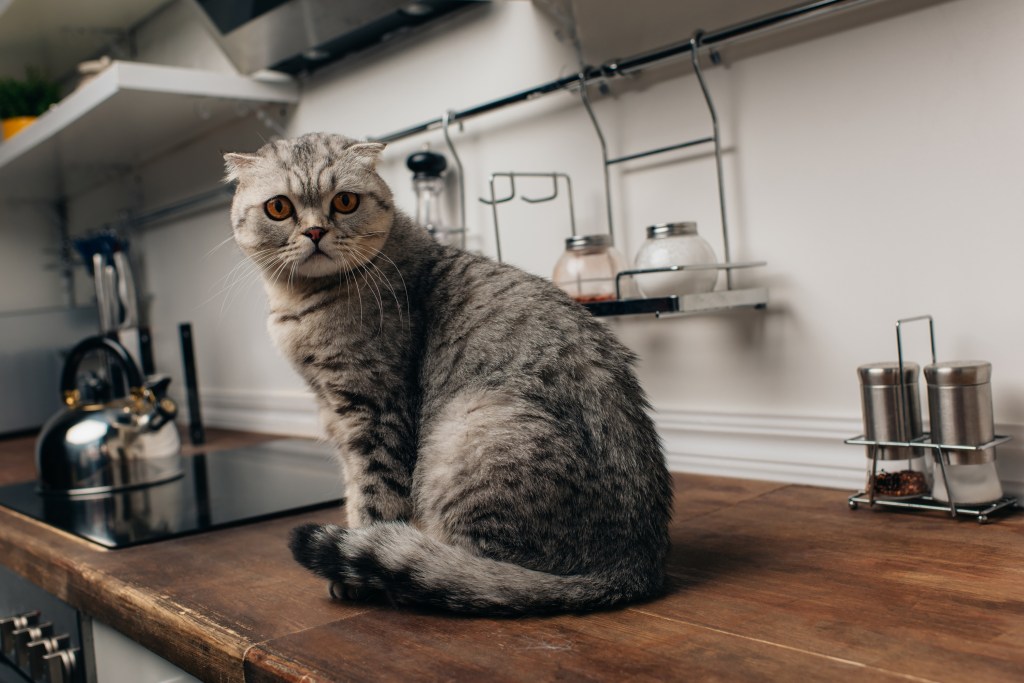Any owner of a feline knows that cats love to jump. That can be problematic, though, if your cat likes to jump on the kitchen counters.
Your cat may touch a hot stove, eat foods that can make her sick, or lick surfaces that you just cleaned with chemicals. Pet hair can get into food that your family will eat. Your cat may have litter and waste stuck to her paws (ick). If that gets on your kitchen counters, it can wind up in food and make people sick.

Understand why your cat jumps on the counters
Before you can address the issue, you need to figure out the reason for the behavior. Pay attention to when your cat jumps on the kitchen counters and what she does when she’s up there.
- Curiosity: Your feline friend may be curious. She may see or smell food on the counters and want to try it, or she may want to play with a utensil that you left sitting out.
- Hunting instinct: Your cat’s hunting instinct may be behind the jumping. Birds are often found in trees. Being up high also can give a cat a good vantage point to spot other forms of prey.
- Feels threatened: A cat may jump on the kitchen counters to see or avoid a perceived threat, such as something that creates a loud noise. Retreating to the counter can let your cat escape the threat and survey her surroundings.
Sometimes cats just want to jump. Your pet’s body and instincts make jumping feel natural, and counters can seem like perfect places to practice jumping skills.

How to deal with your cat’s jumping
If your cat jumps on the counters because she’s attracted to human food, the solution is simple: Don’t leave food on the counters. Store food in the refrigerator or cover it up immediately. Wash dishes or put them in the dishwasher right after you eat.
If curiosity seems to be driving your cat, look for toys that will challenge her and keep her physically and mentally engaged. For example, your pet may enjoy playing with toys that have food hidden inside and that require her to figure out how to get to it.
If your cat jumps when she feels anxious, figure out what triggers her anxiety. Your fur baby may jump to avoid something that you can control, such as the vacuum cleaner, or she may head for the counter at the sound of a loud noise outside, such as a dog barking or a car’s horn.
If you can’t control the source of the anxiety, pheromones may help your cat stay calm. Pheromones can be sprayed or diffused into the air. They release a scent that is soothing to cats but usually undetectable to humans.
If you think that your pet is simply jumping because she wants some exercise or enjoys being up high, give her something else to jump on! A cat tree is a popular solution. You can set a tree in your living room and encourage your cat to jump and climb to her heart’s content.
If the windows in your house don’t have sills that are wide enough for your cat to sit or lie down, consider installing one or more window perches. That can let your cat satisfy her desire to jump and give her an opportunity to see what’s going on outside, which can provide mental stimulation.
Some cat owners find that making the kitchen counters less appealing is an effective solution. Spreading sheets of aluminum foil or sticking double-sided tape on your counters may be enough to discourage your cat from jumping. Your kitty may find those sensations unpleasant on her paws and may be put off by the sound of crinkling aluminum.
If your cat jumps on the counters due to boredom, distracting her may help. When you see your pet on a counter, pull out the cat’s favorite toy and encourage her to come down and play.

Focus on modifying unwanted behavior, not punishment
When your cat jumps on the counters, she’s not trying to upset you or make a mess in your kitchen. She’s simply doing what feels natural. You won’t be able to make your cat stop jumping entirely. Work on getting your pet to jump somewhere else and engage her in other activities that you consider more desirable.
Understanding why your cat jumps on the counters in the first place can help you figure out how to modify the behavior. Giving your pet another place to jump, providing a stimulating activity, or reducing your cat’s anxiety can be effective.
Don’t physically punish or yell at your pet. That can make your cat afraid of you, but it won’t make the counters any less appealing. If anxiety is the underlying cause of her jumping, a negative reaction from you will only make it worse. Use redirection, praise, and positive reinforcement to get the results you want.
If you try one or more of these methods and they don’t work, or if your cat seems anxious and these strategies are ineffective, talk to your veterinarian about ways to manage your cat’s anxiety and modify her behavior. Your vet may recommend other changes to your kitty’s environment and/or medication.



